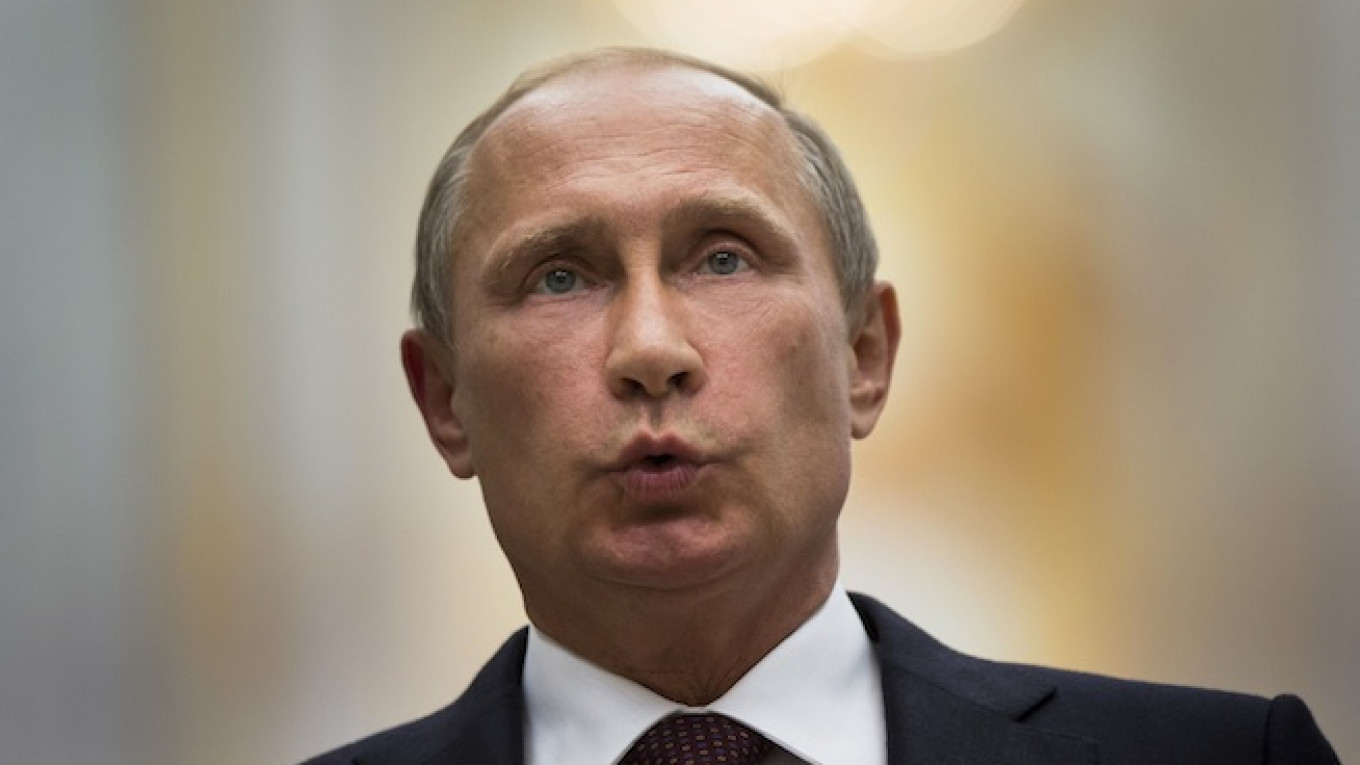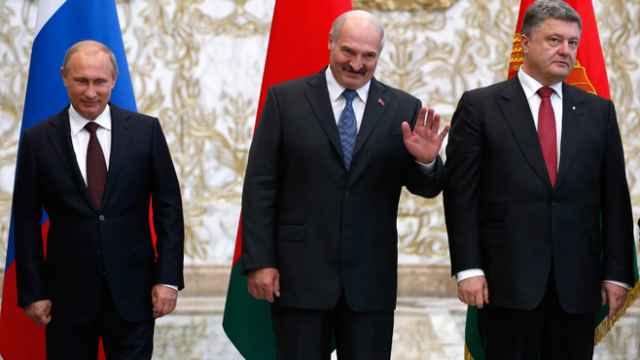A shift in President Vladimir Putin's language on the conflict in eastern Ukraine reflects a transformation in the situation on the battlefield and sounds a warning to Kiev to negotiate sooner rather than later.
Putin's spokesman Dmitry Peskov was quick to tell journalists that the Kremlin leader was not demanding independence for pro-Russian separatists when he said Sunday that talks should take place immediately "on the political organization of society and statehood in southeastern Ukraine."
But in the context of the separatist war in which the rebels have made startling gains in the space of a week — with the help, Ukraine and its Western allies say, of Russian tanks and troops — the formulation had an ominous ring for Kiev.
It was the first time that Putin had publicly talked about "statehood" in the eastern Russian-speaking regions where rebels are fighting to break away from Ukraine, in a war that has killed some 2,600 people since April.
The implication was that if Ukraine fails to reach a quick settlement with the rebels on "federalization," the term Moscow has previously used for enhanced autonomy in the east, then it may find itself facing demands for something much bigger.
"I think it's a conscious or unconscious hint that the longer the situation lasts, and the longer it takes Kiev to discuss it, the worse the conditions will be," said Fyodor Lukyanov, editor-in-chief of the journal Russia in Global Affairs.
After the past week's rebel advances, he said, "I think as a minimum, Ukrainian leaders are being given to understand by Moscow: whatever you do, you will not win this war. Therefore it will either go on endlessly or, as [Putin] said yesterday, substantive negotiations are needed."
In another significant shift in terminology, the name used by the rebels for their eastern lands — Novorossiya, or New Russia — appears increasingly to be part of Kremlin parlance.
Putin first used the expression in April, calling it a Tsarist-era name for territory that had historically been Russian but was incorporated, "God knows why," into Ukraine in the early years of Soviet power in the 1920s.
Ukrainians consider the term deeply offensive and say it shows Moscow's imperial ambition to wrest territory from their thousand-year-old state, which has had shifting frontiers during centuries of dominance by Austria, Poland, Lithuania and Russia.
Putin's spokesman Peskov used the term again on Sunday, and the Kremlin website on Aug. 29 published a message to the rebels entitled "Russian President Vladimir Putin has appealed to the militia of Novorossiya."
Guessing Game
The language coming from the Kremlin appears calculated to increase pressure on Kiev, while keeping Ukraine and the West guessing about Moscow's ultimate objective.
Russia denies intervening in Ukraine militarily despite the protestations of Europe and the U.S., and in the face of overwhelming evidence including satellite imagery, eyewitness reports and the capture of Russian soldiers on the territory of its former Soviet neighbor
What is indisputable is that the separatists, in the space of a week, have recovered from the brink of defeat, opening a new southern front and breaking through to the coast of the Azov Sea, where they succeeded in shelling a Ukrainian navy vessel from the shore on Sunday.
With the rebels firmly back on the offensive, Putin may calculate he can ease back on covert Russian military support and thereby avoid a threatened new round of Western sanctions and a further escalation of tension with NATO, which holds a summit in Wales this week.
As if to emphasize that Russia can turn to powerful alternative partners if further sanctions materialize, he presided on Monday over a ceremony to mark the start of work on Gazprom's 4,000 km (2,500 mile) 'Power of Siberia' pipeline, part of a $400 billion deal to supply Russian gas to China for the next three decades.
Against such an uncertain background — military, political and economic — Putin himself has said in the past week there is no knowing how and when the Ukraine crisis will be resolved.
Russia has several models for the outcomes of "frozen conflicts" that have allowed it to keep leverage over neighbors since the Soviet Union broke up.
Moscow annexed Ukraine's Crimea peninsula in March. In other parts of the former Soviet Union, Russian troops defend a breakaway region of Moldova without recognizing its independence, and safeguard two rebel regions of Georgia that Moscow recognized after a brief war in 2008.
Some analysts speculate Putin might settle for a solution in eastern Ukraine that resembles Bosnia's Serb Republic — an entity formally within Ukraine with sufficient power and autonomy to block Kiev from adopting any course of action that Moscow opposes, in particular any attempt to join NATO.
Lukyanov said Putin himself may not know the final objective.
"I don't think there is any clear model, and the target is moving," he said. "He doesn't have a strategic plan, but at each step he understands what needs to be done.
A Message from The Moscow Times:
Dear readers,
We are facing unprecedented challenges. Russia's Prosecutor General's Office has designated The Moscow Times as an "undesirable" organization, criminalizing our work and putting our staff at risk of prosecution. This follows our earlier unjust labeling as a "foreign agent."
These actions are direct attempts to silence independent journalism in Russia. The authorities claim our work "discredits the decisions of the Russian leadership." We see things differently: we strive to provide accurate, unbiased reporting on Russia.
We, the journalists of The Moscow Times, refuse to be silenced. But to continue our work, we need your help.
Your support, no matter how small, makes a world of difference. If you can, please support us monthly starting from just $2. It's quick to set up, and every contribution makes a significant impact.
By supporting The Moscow Times, you're defending open, independent journalism in the face of repression. Thank you for standing with us.
Remind me later.






